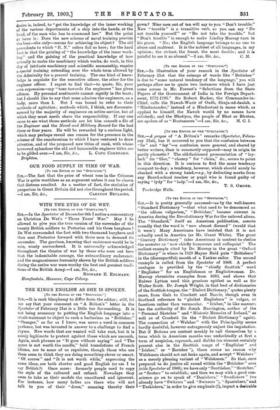THE KING'S ENGLISH AS SHE IS SPOKEN.
[To THE EDITOR OF THE "SPECTATOR."] is rank blasphemy to differ from the editor; still, let me say that your comment on "A Briton's" letter in the Spectator of February 21st is a little too far-reaching. It is not being accessory to putting the English language into a strait-waistcoat to object to such a barbarism as "Britisher."
Granger," as far as I know, was never a word in common parlance, but was invented in answer to a challenge to find a rhyme. New words that are wanted will take root, but it is surely legitimate to protest against those which are uncouth. Again, such phrases as "It goes without saying" and "The game is not worth the candle," bald translations of French idioms, are to some of us repulsive, though those who use them seem to think they are doing something clever or smart. "Of course" and "It is not worth while," expressing the same ideas, are both shorter and good English (or am I to say British ?) Once more : formerly people used to copy the style of the cultured and refined. Nowadays they seem to take as their models the uncultured and ignorant. For instance, how many ladies are there who will not talk to you of their "dress," meaning thereby their
gown? Nine men out of ten will say to you " Don't trouble." Now " trouble " is a transitive verb, so you can say " Do not trouble yourself" or "Do not take the trouble," but " Don't trouble " is enough to make Lindley Murray turn in his grave. "No; the English language belongs to no one to abuse and maltreat. It is the noblest of all languages, in my opinion; the richest, the freest, the most ductile; and it is
painful to see it so abused."—I am, Sir, &c., C. M.










































 Previous page
Previous page